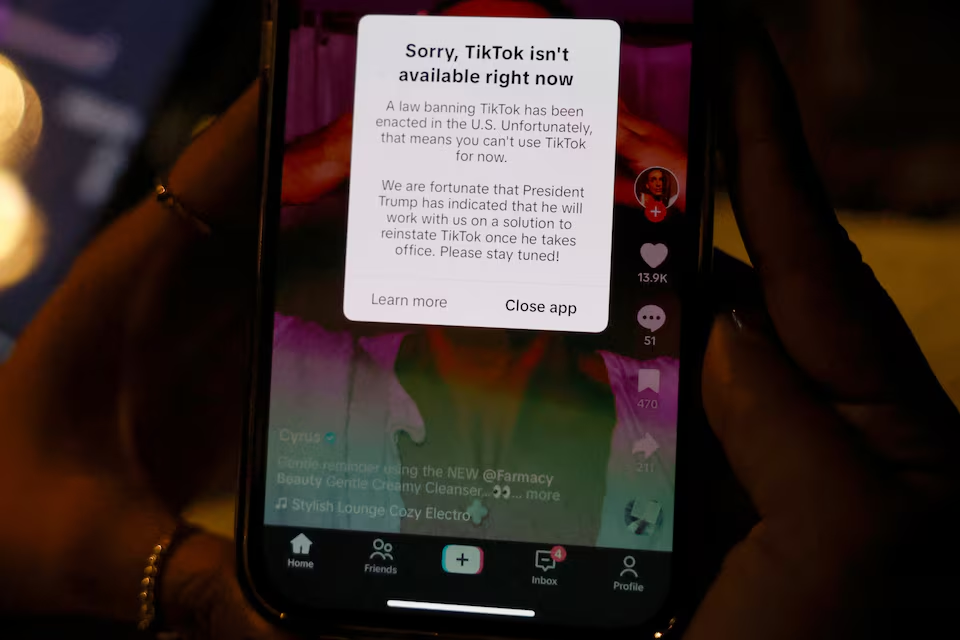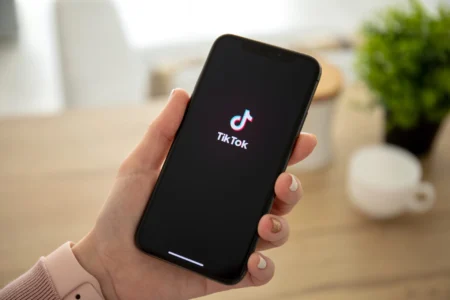TikTok ceased operations in the U.S. late Saturday, disappearing from Apple and Google app stores ahead of a federal ban that takes effect Sunday. The app, used by 170 million Americans, now faces an uncertain future, leaving users, creators, and businesses grappling with the fallout. While some hold out hope for a resolution under President-elect Donald Trump, others are already exploring alternatives and contingency plans.
TikTok’s Shutdown Announcement
At approximately 10:45 p.m. ET on Saturday, TikTok informed users attempting to log in:
“A law banning TikTok has been enacted in the U.S. Unfortunately, that means you can’t use TikTok for now. We are fortunate that President Trump has indicated that he will work with us on a solution to reinstate TikTok once he takes office. Please stay tuned.”
Other apps owned by ByteDance, including CapCut and Lemon8, also went offline and were removed from U.S. app stores. Users reported being unable to access TikTok through the web or mobile devices, signaling the start of the platform’s shutdown.
Legal and Political Context
The Supreme Court unanimously upheld the federal law banning TikTok on Friday, citing national security concerns due to the app’s ties to ByteDance, a China-based company. The law requires TikTok to sever ties with ByteDance or halt operations in the U.S.
President-elect Trump has indicated he may grant TikTok a 90-day reprieve after taking office on Monday, describing it as “most likely appropriate.” However, the White House dismissed TikTok’s announcement as a “stunt,” placing responsibility for any future actions on the incoming administration.
Economic and Cultural Impact of TikTok’s Ban
TikTok’s departure is expected to leave a significant void in the digital economy:
- Small Businesses at Risk: TikTok Shop helped U.S. businesses generate $14.7 billion in sales in 2023, with small enterprises heavily reliant on the platform for marketing and e-commerce.
- Creators’ Livelihoods Disrupted: Influencers and creators earning through sponsorships, brand collaborations, and commissions face a sudden halt to their income streams.
- User Base Displaced: With 170 million active users in the U.S., TikTok played a central role in shaping online culture and providing a platform for community-building.
Many small businesses are now concerned about fulfilling orders and retaining customers, as TikTok’s privacy policy restricts access to user data, including email addresses and purchase histories.
Users Explore Alternatives
As TikTok’s shutdown loomed, users began migrating to alternative platforms, including:
- Instagram Reels: A natural choice for creators familiar with short-form video content.
- YouTube Shorts: Gaining popularity among influencers and advertisers seeking a reliable platform.
- RedNote: An emerging app gaining traction among former TikTok users.
One user posted on RedNote, “This is my new home now,” tagging their post with #TikTokRefugee and #Sad. Meanwhile, web searches for “VPN” spiked as users explored ways to bypass the ban.
Rivals See Opportunities
The ban has boosted investor confidence in TikTok’s competitors:
- Meta Platforms: Instagram and Facebook parent company Meta saw a rise in shares as advertisers shifted budgets to its short-form video features.
- Snapchat: Another platform benefiting from the anticipated influx of users and ad dollars.
Marketing firms have been in a frenzy, described as a “hair on fire” moment, as brands reevaluate their strategies to adapt to the new landscape.
Will TikTok Make a Comeback?
Despite the shutdown, there are signs TikTok could return under Trump’s administration. The President-elect has expressed interest in pursuing a “political resolution,” and TikTok CEO Shou Zi Chew plans to attend Trump’s inauguration and rally on Sunday to advocate for the platform’s reinstatement.
Additionally, U.S. search engine startup Perplexity AI has submitted a merger bid to ByteDance to create a new entity combining TikTok U.S. with other partners. The move aims to address national security concerns while preserving TikTok’s operations in the U.S.
Future Implications
The TikTok ban underscores the growing tension between national security concerns and the digital economy. As the platform navigates legal and political challenges, its impact on small businesses, creators, and online culture remains profound. For now, users and advertisers are left in limbo, adapting to a new reality in the absence of TikTok.
Stay informed on the latest tech and digital economy updates. Subscribe to our newsletter for expert insights and strategies for navigating a post-TikTok world.














